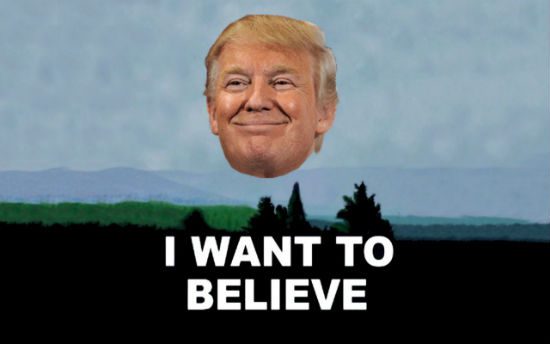A basic rule of civil discourse is the presumption of charity. What that means is that we ought to start off by giving others the benefit of the doubt — the assumption that they are speaking truthfully, in good faith, that they mean what they say.
This idea is a Good Thing. It’s not merely polite, but a moral obligation. This is Golden Rule stuff — treating others as we would want them to treat us. It’s also practical and useful, facilitating clearer communication that helps us to quickly resolve — or at least precisely identify — disagreements. This is where we should begin when we engage in conversation with others.
But it’s not where we always should end. The presumption of charity is exactly that — a pre-sumption. It’s a starting point and a working theory that we should stick with for as long as that theory remains viable. But not after that. The presumption of charity in conversation is just like the presumption of innocence in a criminal trial. Every defendant is presumed innocent unless and until they are proven guilty. When the evidence and the testimony allows for no reasonable doubt that the defendant is, in fact, guilty, then the presumption of innocence no longer holds force. It’s a starting point, but not a mandatory, foreordained conclusion.
The presumption of charity is the subject of a great deal of handwringing among the sort of people who talk a lot about “civility” and “civil discourse” and such. They fret that such high-minded notions are all too rare these days, and that our discourse is suffering as a result.
They’re wrong about that. The problem is not that we have abandoned this presumption of good faith, but that we have become reluctant to abandon it even in the face of clear evidence that it is untenable. Those who make a living by arguing in bad faith know this, and they’ve gotten very skilled at exploiting it. The presumption of good faith has thus been weaponized and turned against itself.

This is what’s missing from this Atlantic article — “How American Politics Became So Exhausting” — in which Emma Green interviews Alan Jacobs. Jacobs is perceptive on many points here, and to his credit he takes pains to acknowledge that “a plea for civility can be a way of consolidating power,” and that the victims of injustice have every right not to allow notions of civility to keep them from seeking redress. But in this bit, he’s missing the forest for the trees:
Conspiracy theories tend to arise when you can’t think of any rational explanation for people believing or acting in a certain way. The more absurd you think your political or moral or spiritual opponents’ views are, the more likely you are to look for some explanation other than the simplest one, which is that they believe it’s true.
One category that’s gone away in America is “wrong.” Nobody is just “wrong.” They’re wicked, they’re evil, they’re malicious, they’re the victims of these vast subterranean forces.
Just consider those first five words: “Conspiracy theories tend to arise.” No. No they do not. Conspiracy theories are not the weather. These are human artifacts — human creations. They do not arise via spontaneous generation. People make them up. People write them.
Normally I get upset when someone refuses to give credit to writers. Here it’s less a case of these writers being denied credit than of them being shielded from blame.
The kinds of “conspiracy theories” Jacobs is talking about are a kind of folklore. They are the work of folks, and cannot “arise” without them. Like most folklore, their composition tends to be both anonymous and collaborative. These stories get invented, embellished, refined, crafted and re-crafted over time. And every step of that process is intentional. That intent may sometimes be less than wholly conscious, but it can never be wholly unconscious either. People are making choices at every step. Others beyond this collaborative process of creation are also making choices — the choice to receive the folklore, the choice to presume its innocence without examination, the choice to pass it along.
It’s difficult to pin down for sure what Jacobs means here by “conspiracy theory.” On the one hand, he seems to be referring to convoluted ideas that involve “some explanation other than the simplest one.” But in the next breath, he describes such thinking as accusatory — as imputing wickedness and malice. The problem here is that such an accusation of malice is sometimes the simplest explanation.
Again, the key distinction here is between our starting point and the conclusions we may reach later based on the evidence before us. Jacobs seems most concerned with certain kinds of conclusions — with concluding that others are “wicked … evil … malicious.” But such conclusions are not the problem when that is what the evidence suggests. Following the evidence to reach such conclusions does not make us more prone to inventing, accepting, or spreading “conspiracy theories.” On the contrary, conspiracy theories tend to arise — i.e., to be deliberately invented, and crafted, and spread — when this attribution of wickedness and evil is our starting point, but we can find no evidence to support it.
Whether we call these “conspiracy theories” or simply false witness borne against our neighbors, such folklore is the embodiment of bad faith, dishonesty, and deliberate malice. And one reason such false witness is so easy to spread these days is because we’ve persuaded ourselves that it would be uncivil — and therefore forbidden — to recognize it as such.












